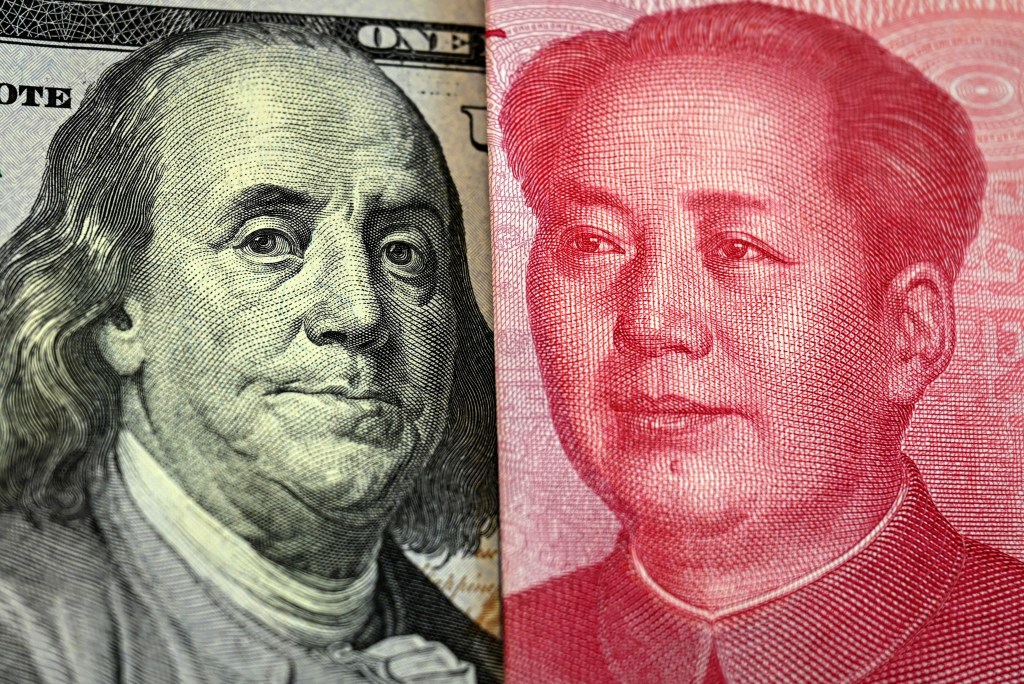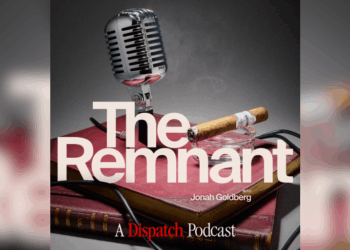
Some geopolitical facts are more obvious than others. For example: The United States and its closest allies—the European Union and NATO, the United Kingdom, Canada and Mexico, Australia and New Zealand, and Japan—can more or less have their way in the world when acting in concert. Throw in even desultory cooperation from India and you have something very like an unstoppable force. On the other hand, the United States, acting alone, cannot even count on winning a trade war with China. From the immediate postwar era through the first Trump administration, Washington exercised global leadership on practically every front—military, diplomatic, economic, cultural, educational, political, philanthropic—not out of some eleemosynary liberality or vague humanitarianism but because American leadership in these areas was part of building a global order that served American interests.
You can call that cynical, but it was enlightened self-interest: Yes, American policy was oriented toward putting the United States at the apex of world affairs, but it also left the world better off: richer, freer, more secure. When countries that had very little in common culturally with the United States decided they wanted some of that power and prosperity for themselves, they didn’t have to stop being Japanese or Korean to get what was best about the American way for themselves, and they didn’t have to pry opportunities out of the grasping hand of Washington. The United States instead welcomed the new prosperity of nations such as Japan, the Republic of Korea, and (imperfectly realized as it may remain) India, and was very happy to see postwar Europe get its act halfway together. Americans cheered heartily as the United Kingdom abandoned the suffocating statism of the 1960s and 1970s under Margaret Thatcher and welcomed even more heightened British prosperity and prestige in the “Cool Britannia” years. Some of that was good-heartedness, but a lot of it was understanding that the United States, home to the world’s most innovative and sophisticated economy, had a lot more to gain from being the top dog in a richer world than a poorer one. Desperately poor people create instability, and they don’t buy a lot of airliners.
E.g.: Germany is a rich country and, if everybody can just avoid doing something stupid, the Germans are going to be great natural-gas customers for U.S. producers. Germans imported some $13.5 billion in oil and gas from the United States in 2024; Haiti, which is much closer to our shores and which produces no fossil fuels of its own, imports U.S. oil and gas, too, but those imports are measured in millions, not billions, of dollars. If Haiti suddenly woke up tomorrow with Swiss governance and a Swiss standard of living, the benefits in Texas, New Mexico, and Pennsylvania would amount to many billions of dollars per year. And there would be more than oil profits in the mix.
That is one of the big reasons the United States has, for many years, been willing to expend a bit of its own treasure—and blood—to help the rest of the world stay safe and grow rich.
Yes, it was galling that the United States contributed so disproportionately to the United Nations, where the gilded exemplars of Davos-circuit nepotism returned the favor by lecturing the United States about this and that, and, yes, it was irritating that the Belgians were always $5 short in the NATO collection plate and expected to get by on the reputations of their chocolates—but to piss away the commanding American position at the center of world affairs over that kind of nickel-and-dime stuff was an act of stupidity of world-historical consequence, one executed with such superciliousness that it calls to mind something Talleyrand didn’t say: “It was worse than a crime—it was a blunder.”
Take in, if you will, the sorry spectacle of U.S. Trade Representative Jamieson Greer, whose name sounds to me like it should be some kind of a feminist whiskey cocktail. (But maybe I am just thirsty.) Beijing, which aims to finish the trade war the dolts in Washington started, has announced new export controls on rare-earth products, including magnets, and has targeted not only the United States but the world at large, empowering Beijing to use selective enforcement of its new licensing regime to make it very expensive to be a friend of the United States. Greer, whining on behalf of the government of these United States of America, protests that that move is “not proportional.” He continued: “It is an exercise in economic coercion on every country in the world.”
I kind of pity the poor silly bootless bastard having to stand out there in the late October wind in nothing but the moral equivalent of his skivvies and pretend that “not proportional” and “an exercise in economic coercion on every country in the world” was not the plainly stated flippin’ policy of the imbecilic and incompetent administration he has chosen to serve for some ineffable reason. Does no one remember the “proportionality” of the so-called Liberation Day tariffs, “proportions” that were simply made up? Does no one remember that the administration targeted every country in the world and a few that were made up?
President Trump, as you may have heard, has a beef with China—not because of the single-party police state or the authoritarianism or the gulags or the torture or the casual political murder or the relentless repression of ethnic and religious minorities (admiring, as a weak man typically does, the pronounced cruelty practiced by Beijing) but because (if I may be permitted to use the idiom of the populist movement behind Trump) them there schemin’ Orientals done stole all our good tire-factory jobs what was took by Linglong. You know the homily: Oh, the wily Chinaman! The economic superman whose work ethic and smart government can accomplish anything … except getting its GDP per capita up there to the levels enjoyed by Kazakhstan or Mexico.
China enjoys a near-monopoly position in the rare-earths business. Not because China is simply blessed with the minerals the way the Permian Basin is blessed with oil but because the United States and most of the other rich countries have made it very, very difficult to process that stuff in their countries. Rare-earths refining is, environmentally speaking, an ugly business, one that makes the environmental impact of fracking for gas look like a rowboat trip across Lake Como. But, as with the extraction and processing of oil and gas, there are better and worse ways to do it, and American firms historically are among the world’s best at solving that kind of engineering challenge, as the U.S. energy industry itself so powerfully demonstrates; there is no reason to think that the rare-earths industry could not develop—and, more to the point, could not have developed—here in the United States, given the right regulatory environment and incentives. But American policymakers chose a different path—the wrong one. As C.S. Lewis argues in a different context, regress is the most progressive thing you do when you are on the wrong path—the sooner you turn back to find your way to the right path, the better. But the Trump administration has not turned back toward the right path: Instead, it is stuck in the freshest economic thinking of the 1860s, trying to magic new supplies into existence through raw subsidies and bargain-basement financing through the Bank of Uncle Stupid. It is not as though there isn’t real political and legislative work to be done, and lots of it—but an administration headed by a profoundly lazy and monumentally stupid man served by a Chalmun’s Spaceport Cantina of half-bright retired middling talk-show hosts is not up to the job.
I once interviewed a science professor who had won the Nobel Prize. He said that the intellectual recognition was nice, and the money was nice, but the great thing about winning the Nobel Prize was that he never had to go to another faculty meeting unless he really wanted to. I am not in line for any Nobel Prize, but I get the sentiment: I went into management early in my career and spent a good, solid decade and change working my way out of it, in no small part because I do not like going to meetings, producing planning documents, or that sort of thing. I am glad that some people do: As I have written many times before, we should not sneer at bureaucracy, inasmuch as excellence in administration is a critical difference between good government and bad government or good corporate management and bad corporate management. Lord help me, I understand at least that much about our addled president: He wants to do his thing and move on to the next thing rather than spend 30 months or whatever going to committee meetings and revising policy documents to get the thing just right. But policymaking isn’t a 750-column or a 45-minute set at the Comedy Cellar–it is a long-term deal, repetitious and halting and frustrating.
Donald Trump is a man with a short attention span, a toddler’s sense of entitlement, a high-school mean girl’s thin skin, and the approximate IQ of today’s lunch special at Joe’s Stone Crab, none of which leaves him very well suited to the kind of long-term administrative and management work that effective policy development requires. The Trump administration does not do implementation. Instead, Trump simply tries to bully his way through every disagreement, assuming—wrongly!—that, as the president of these United States, he’ll always have the biggest stick in the fight. He thinks he is the president of a country club or, as he himself has put it at times, the manager of a department store, a tyrant overseeing a petty domain in which he can rearrange the lives of human beings, nations, and institutions like chessmen. But even within the well-defined borders of a tennis court or a golf course, the real-world math can get pretty hairy pretty quickly, and the world is not a tennis court or a golf course—and Trump does not understand the game he is playing.
There was a time, not that long ago, when the United States had a definite upper hand in its trade relationship with China. To put it in the simplest terms, the Chinese needed American dollars more than Americans needed flip-flops and tires and plastic squirt guns. But China has, in a reasonably predictable fashion, been climbing the value chain. And, somehow, the United States has never figured out how to compete to an entirely satisfactory degree with a rival whose main advantage is being poor and governed by tyrants who are none too picky about labor or environmental standards.
There is a legend about the Buddha that tells of his habit, while traveling as an ordinary wanderer, of allowing himself to be cheated while gambling. He wasn’t particularly attached to the financial sums in question, and he reasoned that the men who were cheating him would have regarded it as an offense to their dignity to go begging, which was their real alternative. He wanted them to have a few extra coins in their purses and did not want to let their pride—much less his—get in the way of the gift. I like that story. It reminds me of another legend in which Queen Victoria supposedly was hosting a foreign dignitary (sometimes identified as the maharaja of Jaipur) unfamiliar with British dining customs: The guest, the story goes, drank from his finger bowl, not knowing what it was, and so Queen Victoria immediately picked up her own finger bowl and drank from it, signaling all of the other guests to follow suit, thereby sparing her guest embarrassment. Abraham Lincoln supposedly surprised a European diplomat who entered the president’s office to find him shining his shoes on his desk. “Mr. President, in my country, a man of your stature would never shine his own shoes!” Lincoln, considering the statement, asked, “Whose shoes would he shine?” What I like about those stories is that each communicates a kind of largeness of spirit, an admirable lack of meanness or pettiness. But each of those stories also communicates something beyond the merely personal: Each supposes a certain kind of more general social attitude, a way of being in the world that goes beyond individual eccentricity or style, coloring human relations as a whole. Each requires some small act of personal sacrifice, one having more to do with status than with money (in the Buddha’s case) or propriety (as in Queen Victoria’s case).
Abraham Lincoln knew a lot of things about a lot of things. And this much he was sure of: Everybody shines somebody’s shoes.
And therein lies the great irony of our moment: Genuine American greatness was built in no small part on humility—not radical humility, not Jesus-takes-on-mortal-flesh-level humility, but the ordinary kind. Yes, the Belgians are going to free-ride a little bit. Yes, the third cousin of some backward satrap is going to come to Turtle Bay and put his mistress up at the Waldorf and lecture us about human rights while his boss is back home stuffing rivals into dungeons or beheading nonconformists in the local sports stadium. But Americans had a sense of what they wanted the world to look like, a sense of how they wanted to conduct themselves in that world, and a sense of how to get there; they were not going to give it up in a fit of pique every time human nature reared its head and in the predictably disappointing fashion. There is a time and a place to sweat the small stuff—the congressional budgeting and appropriations process, for example, or in a courtroom, or when dealing with matters of official procedure touching Americans’ civil rights and economic lives. But we have given up on that wise kind of liberality and instead of finding our way to real greatness with the aid of enlightened humility we are being led into national smallness by boorishness, pomposity, arrogance, bullying, ignorance, bile, and envy. If only we could have it as good as those lucky, free-riding Belgians!
It isn’t just a matter of foreign affairs: The American university system is the envy of the world, and we are burning it down because there’s a couple of nonbinary gender studies professors at Bryn Mawr who say crazy stuff from time to time and there is a brain-dead gaggle of Jew-hating weirdos at Columbia. Of course, there is room for reform. But you don’t have to love every feather on the goose when it is laying golden eggs.
Of course, the Little Americans hate the Ivy League—and Wall Street, and Silicon Valley, and the cities where the people and the GDP are, and Hollywood, and Broadway, and the big New York book publishers, and the newspapers, and the philanthropic foundations, and the think tanks, and the big global companies with the cosmopolitan management teams that create most of the profits and the jobs, and most of the churches, and any institution that has not been mau-maued into making an oath of fealty to the idol of the moment—because they love America, or at least a full 18 percent of it. They are nationalists, of a sort, but nationalists whose friends are all in Moscow and Budapest and whose enemies are all in Los Angeles and Boston. Xi Jinping knows what they are: chumps, albeit dangerous chumps—but less of a danger to his interests today than they were a few years ago.
Xi is 100 percent tyrant and 0.00 percent fool—Donald Trump’s proportions are somewhat differently mixed. It is strange to me that so many of my friends take that, even now, as a comfort.
In Other News …
This, from Mother Jones, is very interesting.
Last year the investigative newsroom Lighthouse Reports obtained a secret archive, containing more than a million instances where Altamides was used to trace cell phones all over the world. This data trove, the majority of which spans 2007 to 2014, is one of the largest disclosures to date of the inner workings of the vast surveillance industry. It does not just list the phone numbers of people who were monitored; it offers, in many cases, precise maps of their movements, showing where they went and when. Over months of research, Lighthouse, Germany’s Paper Trail Media, Mother Jones, Reveal, and an international consortium of partners dug into these logs to understand who was being spied on and why. We identified surveillance targets in 100 countries and spoke to dozens of them. We obtained confidential documents and communications outlining how Altamides—an acronym for “Advanced Location Tracking and Mobile Information and Deception System”—was marketed and deployed. We also interviewed industry insiders and former employees of the company about its operations and clientele.
It is an eye-opening piece of work.
Words About Words
A German phrase I have been working to get into more general circulation is streitbare Demokratie, a kind of constitutional principle common in much of Europe holding that liberal-democratic systems must from time to time use illiberal and antidemocratic means to prevent illiberal and antidemocratic elements from using the instruments of liberal democracy against liberal democracy in the service of dictatorship or repression. Famous examples of this include the abolition of neo-Nazi political parties (and symbols and such) in Germany, political censorship (of books, speeches, films, and media) aimed at certain verboten ideologies or stances, etc. Claire Berlinski, whose work I admire, offers an example of this over the weekend, writing:
I’ve been appalled by what I’ve been seeing on British streets. One puke-making, orgiastic antisemitic rally after another. These aren’t happening in France, because France won’t tolerate them. It’s illegal to gather to shout about how much you love Hamas, laud October 7, and want to see more terrorism. If you try, you’ll be arrested. The courts have upheld this. Does such a ban violate liberal norms? Yes. But so does supporting Hamas and lauding terrorism. If you allow Islamist hooligans to take control of the streets, that’s just what they’ll do. David Frum once remarked that if liberals won’t enforce borders, fascists will. It’s also true of allowing radical mobs to gather and menace the public.
I am of more than one mind about this, possibly more than two. For one thing, I am not much of a believer these days in what we call “American exceptionalism,” but I do very much believe that different countries are different, and that there are lots of perfectly good and decent societies around the world that do not have precisely the kind of liberty we have here in the United States. I am content (in no small part because the Germans are content) to have Germany prohibit neo-Nazi political parties, but I do not imagine that German streitbare Demokratie (or its French equivalent) is any better suited to the United States than is Swiss health care or Swedish taxation or Singaporean land-use rules.
Beyond that, I am not at all sure that streitbare Demokratie actually fortifies democracy and liberalism the way its advocates want it to. Marine Le Pen may be banned from running for president in 2027, but what she stands for is very much alive and well—and, unless I am very much mistaken, ascendant—in France. AfD in Germany is enjoying its strongest support ever. In my view, there is much to admire in the Western European and Scandinavian modes of community life, but there also is much that is suffocating and constraining. That suffocation and those constraints can feed the very things they are intended to starve.
And I am glad Berlinski mentioned David Frum’s observation: Some people see those pro-Hamas rallies in the United Kingdom and see a case for streitbare Demokratie—and some people look at the same evidence and resolve to pull the lever for Nigel Farage because that rabble looks like a powerful case for stronger immigration controls.
When I was young, I took a simpler view of politics: One embraced a set of principles and derived from those principles a solution for every problem. (That is how we libertarians did it, anyway.) If a problem seemed intractable or too complicated for your principles to solve it, then what was needed was a refinement or restatement of one’s principles—one could complicate things so long as one avoided contradiction. The fear of internal contradiction, so pronounced in the works of Ayn Rand and other utopians of that kidney, is a characteristically adolescent attitude. People with more experience often come around to some version of Jonah Goldberg’s description of the conservative sensibility, which he defines as having a great deal to do with “being comfortable with contradictions.”
You can observe that in the real world: My friend Dan Hannan, who serves in the House of Lords, notes the irony in the fact that what is arguably the world’s least democratic parliamentary house in terms of its inputs (someone names you “Lord Thus-’n’-Such” and you’re in for life, and nearly 100 of them are just born into the job) is so reliably democratic in terms of its output. It is a little like our Supreme Court: As long as a majority of the justices are committed to some form of textualism (the radical idea that we write laws down for a reason, and that reason is so that we can know what they say), the Supreme Court is going to produce results that accord reasonably well with our Constitution, which is a liberal-democratic document interpreted by an unreviewable body of political appointees who effectively answer to no one, who wield something very close to arbitrary power, and who are not subject to any democratic check.
I do not know that I think that the First Amendment standard of free speech is universally appropriate. It is what I want for the United States and for myself. What about Germany? I think Germany does a pretty good job managing its political system. So does France. I would estimate that there is at least a 50 percent chance that I end my days in either France, Switzerland, or Canada, all of which have gotten along just fine for a long time without my advice. In that sense, I am a conservative: I am satisfied with those places just the way they are and hope that each will conserve what is best and most distinctive about itself.
I mean, I wouldn’t file a complaint if they made it easier to buy a house in Montreux …
Elsewhere
You can buy my most recent book, Big White Ghetto, here.
You can buy my other books here.
You can check out “How the World Works,” a series of interviews on work I’m doing for the Competitive Enterprise Institute, here.
In Closing
I was very much dispirited by this Washington Post report on a scandal involving an Anglican bishop. Mostly it is the usual thing—men with histories of a particular kind of wrongdoing being installed or kept in leadership positions by a church hierarchy too concerned with discretion—but one troubling aspect stood out: The bishop was being criticized not only for allowing men with troubling histories to serve in leadership positions but also for permitting them to be present as worshipers.
If we restrict worship to the virtuous, strictly defined, then our churches are going to be entirely empty. The churches are there for the sinners—even the gross ones. Of course, a bishop has a pastoral duty to see to the safety of his people, but if the worst person you can think of—cannibal, child molester, J.D. Vance—shows up looking for reconciliation, prayer, and worship, then it is the church’s job—its main job and in some sense its only job—to welcome him. Prodigal son and all that.
In between writing a whole library full of songs about getting drunk and maybe murdering people, Tom Waits wrote one of the great American hymns, which probably could not be performed in most churches: “Down There by the Train.” It is a simple song with a simple theology rendered in an American idiom that is, at its climax, breathtaking, as powerful as “Amazing Grace” or “The Battle Hymn of the Republic.” I always stop at:
There’s no eye for an eye.
There’s no tooth for a tooth.
I saw Judas Iscariot
Carrying John Wilkes Booth.
Get on the train, Waits sings. It is the way to salvation. He offers a poetical account of universal fallenness. There is no first class on his train.
If you live in darkness,
If you live in shame—
All of the passengers
Will be treated the same.
Old Humpty Jackson and Gyp the Blood will sing.
And Charlie Whitman is holding onto Dillinger’s wing.
Charles Whitman and John Dillinger you will know. Gyp the Blood (real name Harry Horowitz) ran the Lenox Avenue Gang in New York in the early 20th century; Humpty Jackson, a hunch-backed crime boss who read Greek and Latin in his spare time and gave orders sitting atop a tombstone, was one of the last of the independent, pre-Mafia underworld chieftains. He did time in Sing Sing and was hailed as the “King of New York Gangsters.” He later owned a pet shop. Charles Whitman was a mass murderer, but chances are excellent that Gyp the Blood and Humpty Jackson had more bodies on them than the great terror of Austin did.
“Meet me down there by the train.”
Church management is a tricky and complicated business. I am glad that it is not my job. But I do know this much: The church is there for Gyp the Blood and Humpty Jackson, for Charlie Whitman and John Wilkes Booth and me. If there is no room for the worst of the worst in your church, then you do not have a church: You have a crappy book club.

















